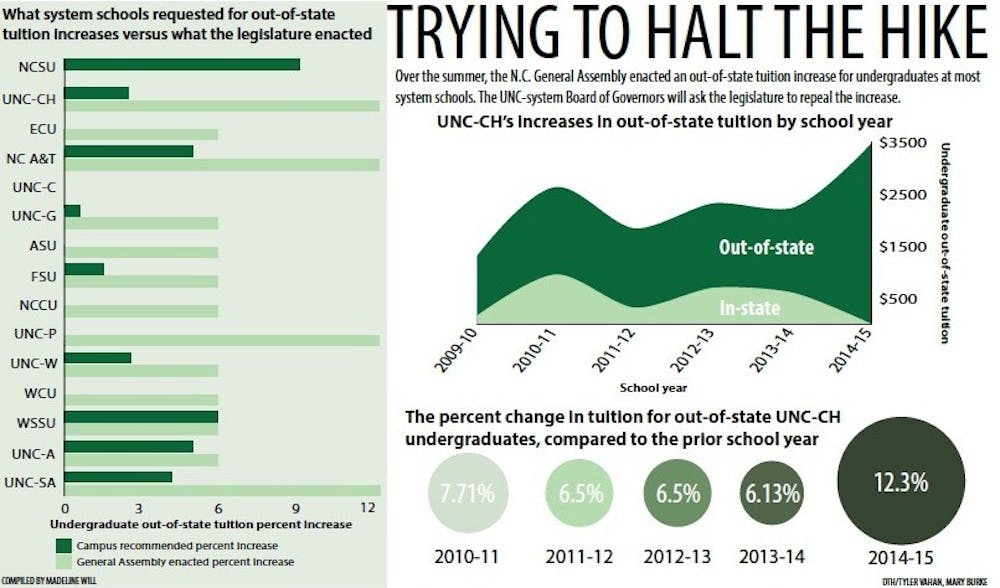“Hopefully they will consider it in a thoughtful way and at least understand why we don’t think it’s a good idea for the General Assembly to be stepping in and taking over some of the responsibilities of the board,” Gage said.
Board chairman Peter Hans said he and other system officials have regular talks with legislators.
“There are some who would like to see continued cuts to the university,” he said. “There are others who have a longer-term vision about the university’s potential and its importance currently to North Carolina, and I think they’ll carry the day ultimately.”
Still, legislators have several priorities to consider with a tight budget, Hans said.
The board was not unanimous in its decision to ask the legislature to repeal the increase. Marty Kotis, a board member who voted nay, said he plans on showing his support of the increase to legislators.
“I think we have a constitutional duty to the people of the state to provide as free as possible an education. I don’t feel like (we do that) when we shift costs to people of the state from out-of-state students,” he said.
Board member Steven Long said he’s talked to some legislators and he doesn’t think they’ll be convinced to repeal.
“When you look at our nonresident tuition compared to our peer groups, it’s still very low, even with this nonresident tuition increase,” he told the board. “I don’t think it’s necessary to go back — it’s not advisable to go back and refight that war.”
Staying competitive
Steve Farmer, UNC’s vice provost for enrollment and undergraduate admissions, said while UNC is in the middle of its peer group in terms of tuition, those aren’t the only schools it is competing with.
“We’re competing with top-30 universities and flagship universities across the country,” he said. “Out-of-state students really have a lot of choices.”
He said a University survey of prospective students found that such a steep increase will have a negative effect on applications and enrollment.
To get the day's news and headlines in your inbox each morning, sign up for our email newsletters.
“You can’t just assume that because we have a lot of applications, people are willing to pay drastically more,” he said. “I understand these things are tricky and I sympathize, but I don’t think the increase on the table right now is one our market is willing to support right now.”
He said next year will likely see a decrease in applications and enrollment due to the hike.
Shirley Ort, UNC associate provost and director of scholarships and student aid, said in an email that her office will determine in the next few days how to handle the added need.
A major portion of the money generated from the tuition increase will go to cover legislative budget reductions — $12.5 million will be available for use by the campuses.
Need-based financial aid is one of the proposed uses.
Leslie Sierra, a freshman from San Antonio, said in addition to her work-study job and partial Carolina Covenant scholarship, the increase might cause her to take out loans.
“My mom always said, ‘don’t let price be an issue, worst comes to worst, we’ll take out loans,’ but as a student, that’s not ideal,” she said. “A huge part of my decision was knowing I could come to a school like this without having to pay the full cost of out-of-state tuition.”
Senior writer Amy Tsai contributed to reporting.
state@dailytarheel.com




